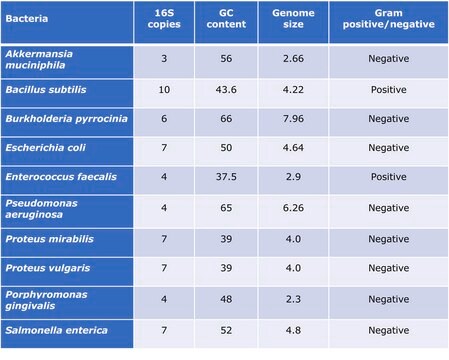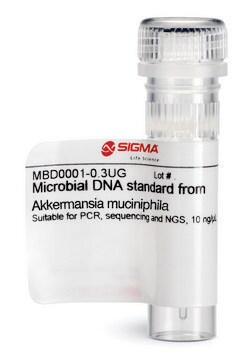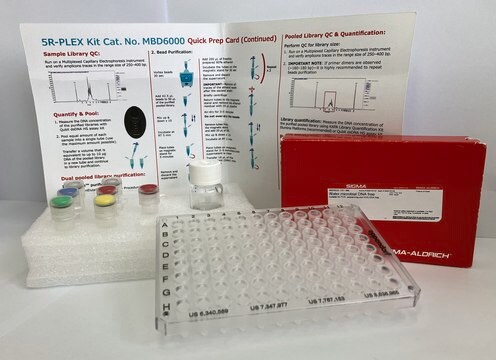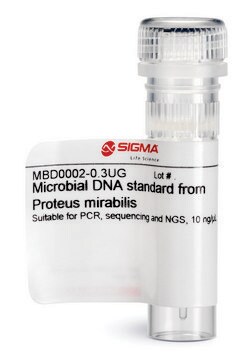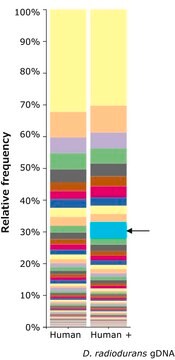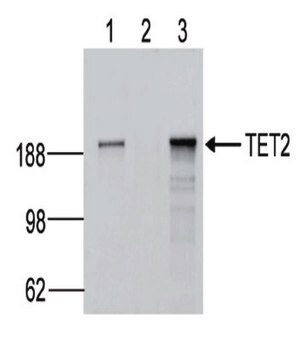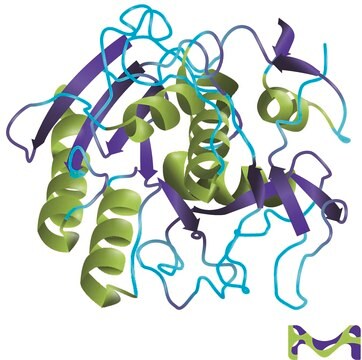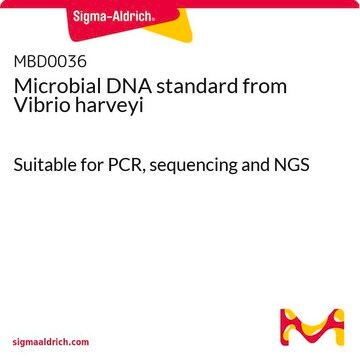MBD0003
Microbial DNA standard from Proteus vulgaris
Suitable for PCR, sequencing and NGS
Se connecterpour consulter vos tarifs contractuels et ceux de votre entreprise/organisme
About This Item
Code UNSPSC :
12352200
Nomenclature NACRES :
NA.24
Produits recommandés
Niveau de qualité
Forme
liquid
Concentration
10 ng/μL
Technique(s)
DNA extraction: suitable
DNA sequencing: suitable
PCR: suitable
Conditions d'expédition
ambient
Température de stockage
−20°C
Description générale
Standardization of sample analysis is currently needed in microbiome genomics research workflow. Lack of standardization can lead to biases and errors in common processes during sample preparation and analysis such as sample amplification, sequencing and bioinformatics analyses.1 Proteus vulgaris genomic DNA microbial standard can serve as standard for benchmarking the performance along the workflow of microbiomics or meta-genomics analyses and as a tool to increase reproducibility and allow comparison of results obtained by different labs.
Proteus vulgaris is a rod-shaped gram negative, facultative anaerobe bacterium. It inhabits the intestinal tract of humans and animals and can be found in soil, water and feces.2 P. vulgaris is a member of Enterobacteriacea family that are opportunistic pathogens in humans, responsible for urinary tract and burn infections. 3 P. vulgaris was also observed fecal samples of healthy individuals. 4Read here how to use our standards to ensure data integrity for your microbiome research.
Application
Suitable for Quantitative standard for PCR, Sequencing and NGS
Caractéristiques et avantages
- Individual microbial standard for microbiomics and meta-genomics workflow
- Suitable standard for PCR, sequencing and NGS
- Improve Bioinformatics analyses
- Increases reproducibility
- Compare results lab to lab
Forme physique
Liquid -The genomic DNA is provided at ≥10 ng/μl concentration in TE buffer pH 8.0
Code de la classe de stockage
12 - Non Combustible Liquids
Classe de danger pour l'eau (WGK)
WGK 1
Point d'éclair (°F)
Not applicable
Point d'éclair (°C)
Not applicable
Faites votre choix parmi les versions les plus récentes :
Certificats d'analyse (COA)
Lot/Batch Number
Vous ne trouvez pas la bonne version ?
Si vous avez besoin d'une version particulière, vous pouvez rechercher un certificat spécifique par le numéro de lot.
Déjà en possession de ce produit ?
Retrouvez la documentation relative aux produits que vous avez récemment achetés dans la Bibliothèque de documents.
Proteus vulgaris urinary tract infections in rats; treatment with nitrofuran derivatives
D. J. N. Hossack
British Journal of Pharmacology and Chemotherapy, 306-312 (1962)
Nerea Porres-Osante et al.
Microbial ecology, 70(1), 132-140 (2014-12-17)
The intestinal tract is a huge reservoir of Enterobacteriaceae, some of which are opportunist pathogens. Several genera of these bacteria harbour intrinsic antibiotic resistance genes, such as ampC genes in species of Citrobacter, Enterobacter or Escherichia genera. In this work
D C Morrison et al.
Annual review of medicine, 38, 417-432 (1987-01-01)
In this chapter, current concepts about the mechanisms of action of endotoxin are reviewed. Particular attention is focused upon endotoxin-induced production of soluble mediators from macrophages and mononuclear cells and on the potential contribution of these mediators to endotoxin shock.
J Paul Brooks et al.
BMC microbiology, 15, 66-66 (2015-04-17)
Characterizing microbial communities via next-generation sequencing is subject to a number of pitfalls involving sample processing. The observed community composition can be a severe distortion of the quantities of bacteria actually present in the microbiome, hampering analysis and threatening the
Notre équipe de scientifiques dispose d'une expérience dans tous les secteurs de la recherche, notamment en sciences de la vie, science des matériaux, synthèse chimique, chromatographie, analyse et dans de nombreux autres domaines..
Contacter notre Service technique